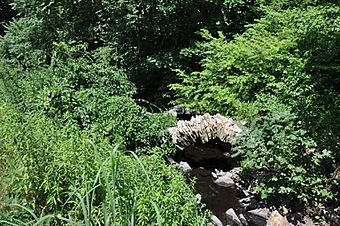Mill Brook Bridge facts for kids
Quick facts for kids |
|
|
Mill Brook Bridge
|
|

Bridge remnant, 2016
|
|
| Location | Blissville Rd., jct. of Mill Brook, Lisbon, Connecticut |
|---|---|
| Area | less than one acre |
| Architectural style | masonry arch |
| NRHP reference No. | 96001498 |
| Added to NRHP | January 2, 1997 |
The Mill Brook Bridge is a very old stone arch bridge in Lisbon, Connecticut. It is located just north of Lower Blissville Road. Experts believe it was built in the 1790s. This makes it probably the oldest stone arch bridge still standing in Connecticut! It was added to the National Register of Historic Places in 1997. Since then, parts of the bridge have fallen apart.
Contents
Discover the Mill Brook Bridge
The Mill Brook Bridge is found near the Shetucket River. It sits on the north side of Lower Blissville Road. This is close to where Icehouse and Blissville Roads meet. The bridge is a single arch made of stone. It stretches about 10 feet (3 meters) over Mill Brook. Today, the road crosses the brook on a modern steel bridge.
A Look at the Bridge's Design
The arch of the bridge was built using rough, uneven stones. These stones were originally laid without any mortar, which is like glue for bricks. This style is called "dry laid." The bridge would have had layers of soil on top. A roadbed would have been built over that. The arch was once about 18 feet (5.5 meters) wide. Over time, the top layers have worn away. Part of the stone arch has also collapsed.
How Old Is This Bridge?
This bridge is very old! It was likely built in the 1790s. This makes it one of the oldest bridges in Connecticut. It was added to the National Register of Historic Places in 1997. This list recognizes important historical places in the United States.
The Bridge's Journey: A Relocation Story
The Mill Brook Bridge was not always in its current spot. It used to be where Lower Blissville Road is now. In 1915, a new, modern bridge was built there. So, the old stone bridge was moved to its present location.
An Important Road Through History
The road that the bridge served has a long history. It was opened by 1717. This route connected the towns of Norwich and Plainfield. By the late 1700s, it became a "post route." This meant more stagecoaches used the road to deliver mail. In 1790, the town of Lisbon improved the route. Records from 1792 mention a "stone causeway" on Bundy Hill. This was a raised road made of stone.
Building Bridges in the Old Days
The way the Mill Brook Bridge was built tells us about its age. It used dry-laid stones that were roughly cut. This was common for bridges built during that time. Later bridges often used mortar to hold stones together. They also used stones that were cut more smoothly. This helps experts guess when the Mill Brook Bridge was made.



